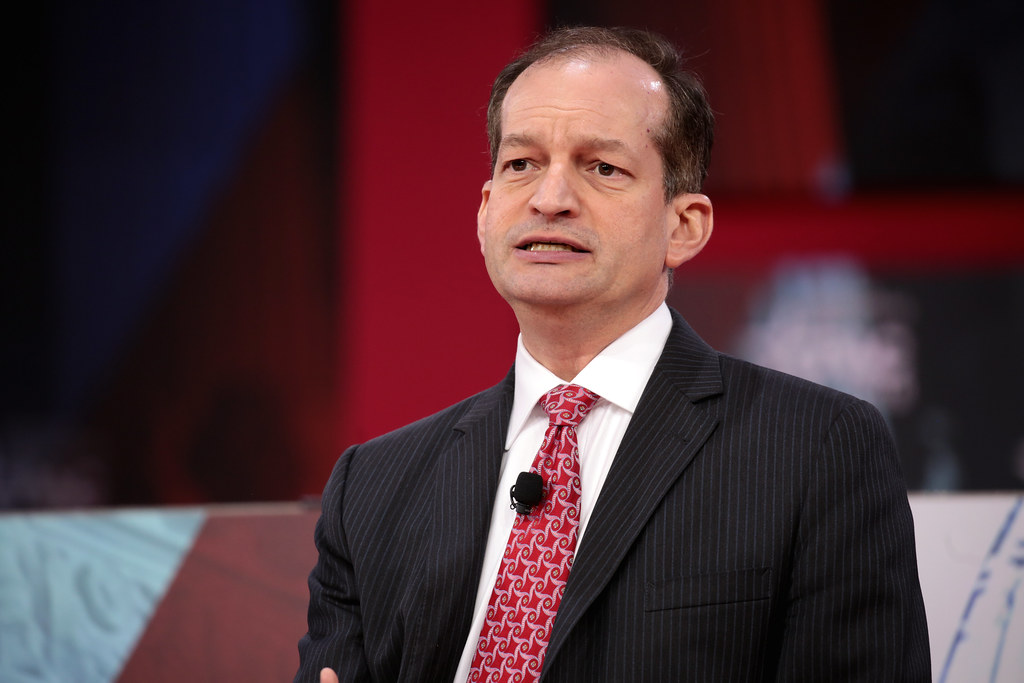Key Takeaways
• Lawmakers called the Alex Acosta hearing “fishy” after his closed-door session.
• Former Labor Secretary Alex Acosta showed little remorse for the Epstein plea deal.
• Some members accused Acosta of memory lapses and shielding powerful allies.
• Democrats vow to follow the money and press for more answers.
• Survivors of Jeffrey Epstein praised lawmakers’ push for truth.
Inside the Alex Acosta Hearing
Former Labor Secretary Alex Acosta faced the House Oversight Committee in a closed-door session. Lawmakers grilled him on the 2007 plea deal he arranged for Jeffrey Epstein. Now, many in Congress suspect something is hiding just out of sight.
Background of the Epstein Plea Deal
Seventeen years ago, Alex Acosta led federal prosecutors in Miami. They struck a deal with Epstein that critics call a sweetheart plea. As a result, Epstein served just 13 months in jail. Many say this deal failed survivors of sex trafficking. In 2019, Epstein died in jail amid new charges. Questions swirled about who knew what—and when.
What Happened in the Closed-Door Meeting
On Friday, Acosta entered a secure room on Capitol Hill. No cameras were allowed. Reporters could not ask him questions as he walked in. Inside, members from both parties took turns pressing him. According to attendees, Acosta seemed defensive and distant. He claimed to have little memory of key facts. He told lawmakers he did not doubt the survivors’ credibility, yet his words suggested otherwise.
Lawmakers’ Reactions
Representative Suhas Subramanyam of Virginia spoke after the hearing. He said the Alex Acosta hearing felt “defiant” and lacking remorse. He added that many GOP members handed Acosta soft questions. Subramanyam found it hard to believe Acosta knew nothing. After all, he had overseen the entire Epstein case. In addition, Subramanyam pointed out that Epstein and former President Trump were allies. He noted that six years after the plea deal, Trump nominated Acosta for Labor Secretary.
Representative Robert Garcia of California also weighed in. He called Acosta “not credible” and claimed a cover-up was under way. Together, Democrats plan to dig deeper. They want bank records, travel logs and witness statements. They promise to follow the money that once fueled Epstein’s trafficking ring.
Why They Suspect a Cover-Up
Several factors raised red flags:
• Faded Memory Claims: Acosta said he did not recall details from his own case file.
• Survivor Doubts: He admitted skepticism about the victims’ stories.
• Softball Questions: Some Republicans asked gentle, supportive questions.
• Epstein’s Powerful Friends: The financier had ties to politicians and celebrities.
All these points made lawmakers wonder if powerful figures influenced the plea deal. They suspect someone may have hidden emails, notes or other critical files. In turn, survivors still fight for justice and answers.
Key Moments from the Hearing
First, Acosta told investigators he did not see the full scope of Epstein’s actions. Next, he insisted that the deal was the best outcome at the time. Then, he said he believed survivors could tell lies or exaggerate. Finally, he avoided direct confession of error. Throughout, he claimed to follow standard practices for a federal prosecutor.
What Happens Next
Lawmakers plan more hearings. They will seek public sessions to shine light on hidden details. They may issue subpoenas for documents and witnesses. Meanwhile, advocacy groups call on the Justice Department to reopen the case. They argue the plea deal violated victims’ rights. Moreover, some survivors plan to testify before Congress. They hope to break the silence and demand accountability.
In addition, media outlets will keep pressure on key figures. Rumors swirl that more politicians may have known about Epstein’s crimes. Investigations could uncover new evidence of wrongdoing. Either way, the Alex Acosta hearing marks just the beginning of a larger fight for truth.
Conclusion
The Alex Acosta hearing exposed deep tensions on Capitol Hill. Lawmakers from both parties expressed alarm over his lacking remorse. They accused him of sketchy memory claims and shielding powerful friends. Democrats promise to press forward, unraveling every thread of this case. As survivors and advocates push for justice, the nation watches to see what secrets still lie hidden.
FAQ
What was the main deal Acosta made with Epstein?
Acosta approved a plea agreement that limited Epstein’s jail time and protected his associates from federal charges. Critics say it gave Epstein a light sentence on serious sex-trafficking accusations.
Why did lawmakers call the hearing “fishy”?
They found Acosta’s memory lapses and dismissive tone suspicious. They also noted that some committee members asked only easy questions. Together, these factors fueled claims of a cover-up.
Will new charges come from this hearing?
While the hearing itself does not bring charges, it could lead to fresh investigations. Lawmakers may issue subpoenas for records and demand more public testimony. If they find new evidence of crimes, prosecutors could reopen the case.
How can survivors help in this process?
Survivors can submit statements, testify in public sessions, and work with advocacy groups. Their firsthand accounts can guide lawmakers and prosecutors toward justice.
